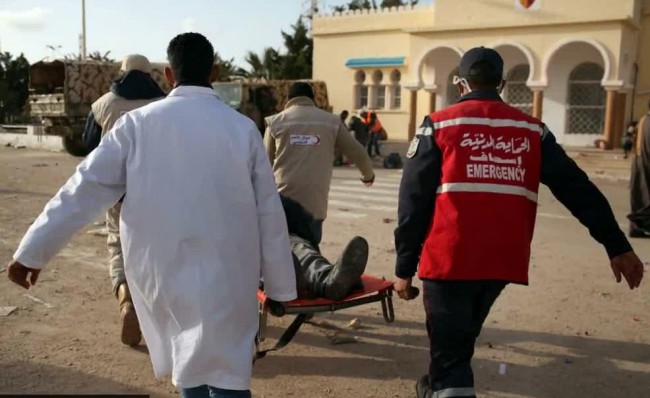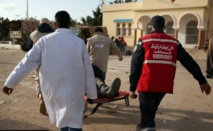"An extensive wave of arrests was conducted overnight of suspects involved in two incidents of attacking military ambulances near Majdal Shams in the Golan Heights and near Hurfesh," a statement said.
Further details of the investigations into both incidents remain under a gag order.
Syria's Druze minority are traditional allies of President Bashar al-Assad, and the rioters on Monday probably believed the men in the ambulance were rebels fighting to unseat him.
On June 10 at least 20 Syrian Druze were reportedly killed in an unprecedented shoot-out with Al-Qaeda affiliate Al-Nusra Front in northwestern Syria.
Syria has said the two men attacked in the ambulance were members of Al-Nusra Front. Israel says they were civilians.
Druze leaders have pressed Israel to take a more active role in the Syrian war, but Israeli Defence Minister Moshe Yaalon reiterated that no internal pressures or acts of violence would "drag us into a war that is not ours."
"We will continue to provide humanitarian aid to women, children and wounded people who reach the field hospital we set up along the border in the wake of the difficult situation," he said at an IT security conference in Tel Aviv.
Israel does not rule out the possibility that some of those given medical care are rebels.
Prime Minister Benjamin Netanyahu has described the Golan Heights killing as a "lynching" and met Wednesday with local Druze leaders, who roundly condemned the attack.
He urged leaders to "continue to act to ensure the security of the state, and to allow soldiers to carry out their duties," according to a statement released after the meeting.
"We need to protect our country from the chaos unfolding around us," he said.
The spiritual leader of the Israeli Druze, Sheikh Muwafaq Tarif, was quoted in the same statement as condemning the ambulance attack, which he said was "contrary to Druze values."
The Druze are a secretive offshoot of Shiite Islam. Officials say there are 110,000 of them in northern Israel and another 20,000 in the Israeli-occupied Golan.
Israel seized 1,200 square kilometres (460 square miles) of the Golan Heights from Syria in the 1967 Six Day War.
-------------------------------------------------------------------------------------
Further details of the investigations into both incidents remain under a gag order.
Syria's Druze minority are traditional allies of President Bashar al-Assad, and the rioters on Monday probably believed the men in the ambulance were rebels fighting to unseat him.
On June 10 at least 20 Syrian Druze were reportedly killed in an unprecedented shoot-out with Al-Qaeda affiliate Al-Nusra Front in northwestern Syria.
Syria has said the two men attacked in the ambulance were members of Al-Nusra Front. Israel says they were civilians.
Druze leaders have pressed Israel to take a more active role in the Syrian war, but Israeli Defence Minister Moshe Yaalon reiterated that no internal pressures or acts of violence would "drag us into a war that is not ours."
"We will continue to provide humanitarian aid to women, children and wounded people who reach the field hospital we set up along the border in the wake of the difficult situation," he said at an IT security conference in Tel Aviv.
Israel does not rule out the possibility that some of those given medical care are rebels.
Prime Minister Benjamin Netanyahu has described the Golan Heights killing as a "lynching" and met Wednesday with local Druze leaders, who roundly condemned the attack.
He urged leaders to "continue to act to ensure the security of the state, and to allow soldiers to carry out their duties," according to a statement released after the meeting.
"We need to protect our country from the chaos unfolding around us," he said.
The spiritual leader of the Israeli Druze, Sheikh Muwafaq Tarif, was quoted in the same statement as condemning the ambulance attack, which he said was "contrary to Druze values."
The Druze are a secretive offshoot of Shiite Islam. Officials say there are 110,000 of them in northern Israel and another 20,000 in the Israeli-occupied Golan.
Israel seized 1,200 square kilometres (460 square miles) of the Golan Heights from Syria in the 1967 Six Day War.
-------------------------------------------------------------------------------------









 Home
Home Politics
Politics











